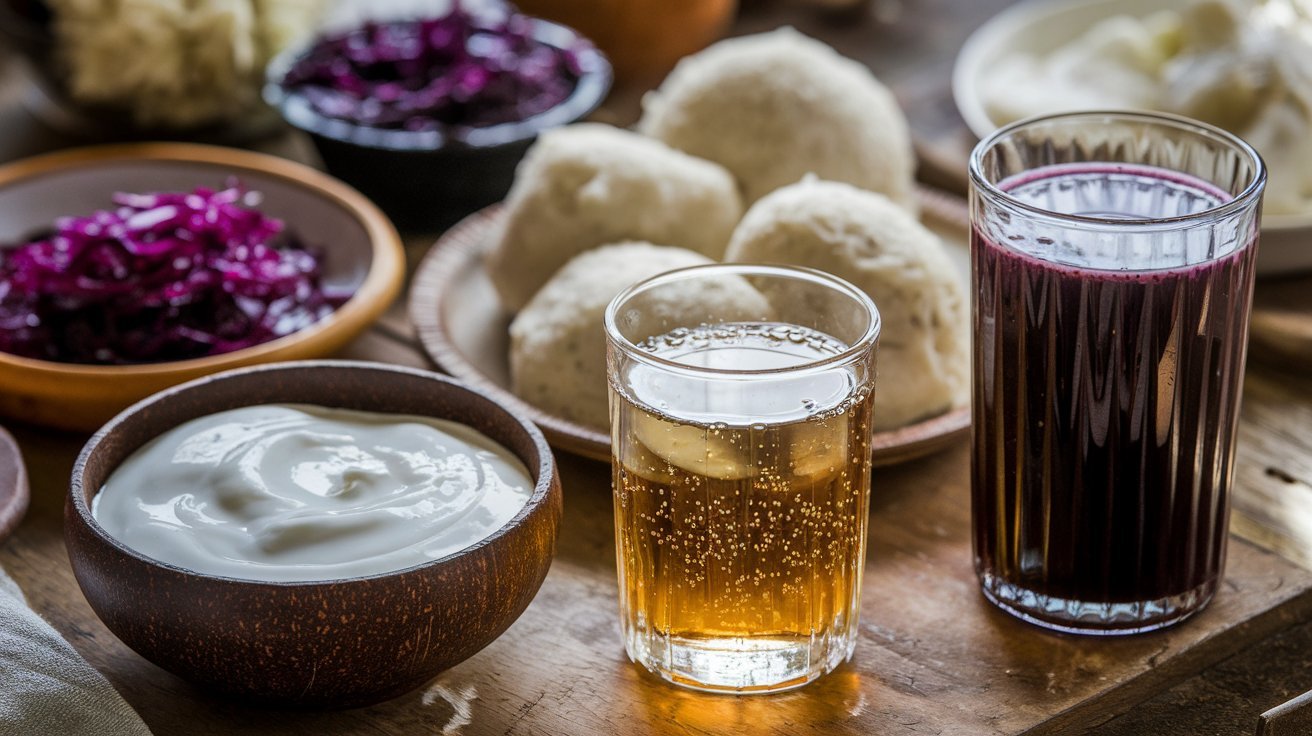Explore Healthy Living
Fermented foods have been a part of human diets for centuries, offering not just unique flavors but also numerous health benefits. The fermentation process enhances food preservation, boosts its nutritional profile, and introduces beneficial probiotics that support gut health. Fermented foods are produced by the natural breakdown of carbohydrates by microorganisms such as bacteria, yeast, and mold. This process enhances the bioavailability of nutrients, making them easier to absorb. Additionally, fermented foods help balance the gut microbiome, which plays a crucial role in digestion, immune function, and even mental health. Scientific studies suggest that consuming a variety of fermented foods can support digestion, strengthen immunity, and even reduce inflammation. Let’s explore the 20 best fermented foods and their scientifically-backed health benefits, along with detailed recipes to incorporate them into your diet.
1. Yogurt
Yogurt is one of the most well-known probiotic-rich foods. It is made by fermenting milk with beneficial bacteria such as Lactobacillus and Bifidobacterium. These live bacteria help break down lactose, making yogurt easier to digest than regular milk. It is widely consumed across the globe and can be found in various forms, including Greek yogurt, Icelandic skyr, and traditional plain yogurt.
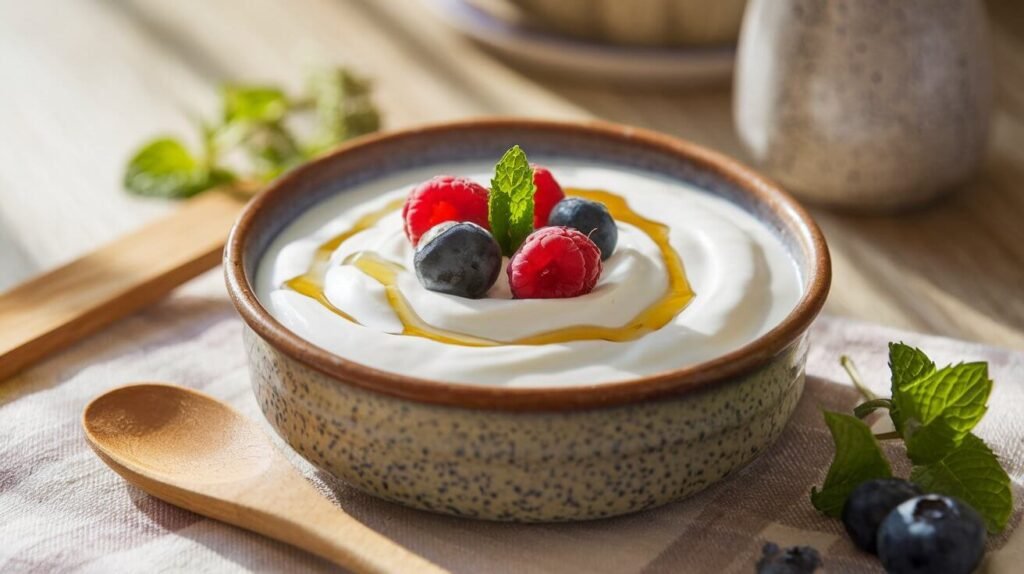
Recipe: Homemade Yogurt
Ingredients:
- 4 cups of whole milk
- 2 tablespoons of plain yogurt with live cultures
Instructions:
- Heat the milk in a saucepan over medium heat until it reaches 180°F (82°C), then let it cool to about 110°F (43°C).
- Mix a few tablespoons of the cooled milk with the plain yogurt in a small bowl.
- Add this mixture back into the warm milk and stir well.
- Pour into a container and let it incubate at 110°F for 6-12 hours until thickened.
- Refrigerate and enjoy!
Health Benefits
- Supports gut health by introducing beneficial probiotics.
- Improves lactose digestion for those with mild lactose intolerance.
- Strengthens the immune system and reduces inflammation.
2. Kefir
Kefir is a fermented dairy drink containing a diverse range of probiotics. It has a tangy, slightly fizzy taste and is made by adding kefir grains to milk. Unlike yogurt, kefir contains a broader spectrum of bacteria and yeast, making it an excellent probiotic source.
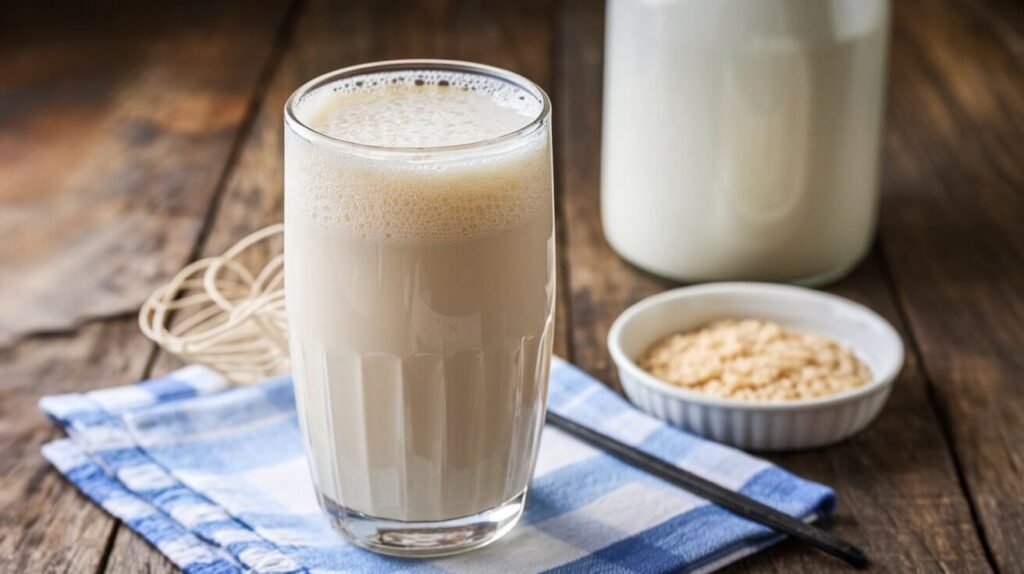
Recipe: Homemade Kefir
Ingredients:
- 4 cups of whole milk
- 2 tablespoons of kefir grains
Instructions:
- Place the kefir grains in a clean glass jar.
- Pour milk over the grains and cover the jar with a breathable cloth.
- Let it ferment at room temperature for 12-24 hours.
- Strain out the kefir grains and store the kefir in the fridge.
- Use the grains to start a new batch!
Health Benefits
- Enhances gut microbiome diversity and supports digestion.
- Rich in calcium and probiotics, improving bone health.
- May have anti-inflammatory and antimicrobial properties.
3. Sauerkraut
Fermented cabbage, known as sauerkraut, is rich in probiotics and vitamin C. It has been a staple in European diets for centuries and is known for its tangy flavor.
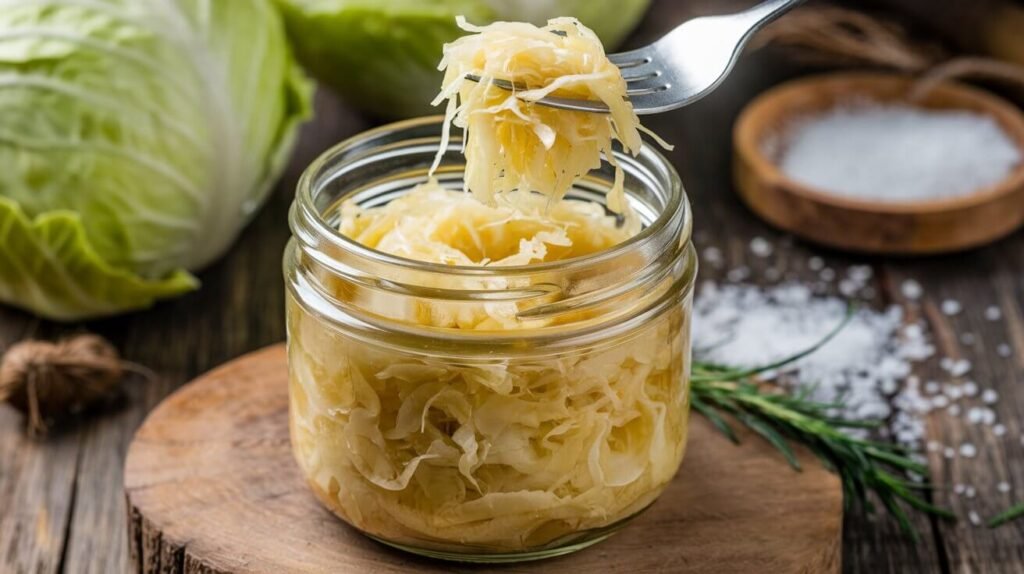
Recipe: Homemade Sauerkraut
Ingredients:
- 1 medium cabbage, shredded
- 1 tablespoon sea salt
Instructions:
- In a large bowl, massage the salt into the shredded cabbage for about 10 minutes until it releases liquid.
- Pack the cabbage tightly into a jar, ensuring it is submerged in its liquid.
- Cover with a cloth and let it ferment at room temperature for 1-4 weeks.
- Refrigerate and enjoy!
Health Benefits
- Supports digestion with natural probiotics.
- Rich in vitamin C and antioxidants for immune health.
- May help reduce bloating and promote a balanced gut microbiome.
4. Kimchi
Kimchi, a staple in Korean cuisine, is packed with Lactobacillus kimchii and antioxidants. It is a spicy, tangy fermented cabbage dish with variations that include radish, cucumber, and other vegetables.
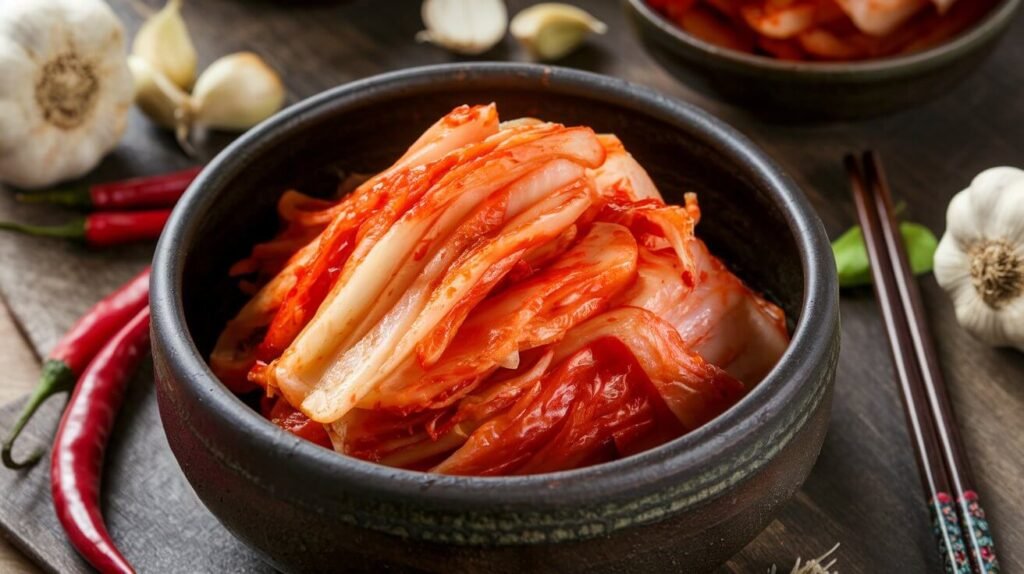
Recipe: Homemade Kimchi
Ingredients:
- 1 medium napa cabbage, chopped
- 1 tablespoon sea salt
- 2 cloves garlic, minced
- 1 teaspoon grated ginger
- 2 tablespoons Korean red pepper flakes (gochugaru)
- 1 tablespoon fish sauce (optional)
Instructions:
- Massage salt into the cabbage and let it sit for 1-2 hours.
- Rinse and drain the cabbage.
- Mix garlic, ginger, pepper flakes, and fish sauce to create a paste.
- Coat the cabbage with the paste and pack it into a jar.
- Let it ferment for 3-7 days, then refrigerate.
Health Benefits
- Contains powerful antioxidants that may reduce inflammation.
- Supports gut health with a diverse range of probiotics.
- May improve metabolic health and aid in weight management.
5. Miso
Miso is a fermented soybean paste used in Japanese cuisine. It is made by fermenting soybeans with salt and Aspergillus oryzae mold, creating a rich umami flavor.

Recipe: Miso Soup
Ingredients:
- 4 cups of water
- 2 tablespoons miso paste
- 1/2 cup diced tofu
- 1 sheet nori (seaweed), chopped
- 2 green onions, sliced
Instructions:
- Heat water in a pot and add tofu and nori.
- Dissolve miso paste in a small bowl with warm water and stir into the pot.
- Simmer for 5 minutes and garnish with green onions.
Health Benefits
- Supports digestion and promotes gut health.
- Rich in essential nutrients like vitamin K, protein, and minerals.
- Contains antioxidants that may lower the risk of chronic diseases.
6. Tempeh
Tempeh is a fermented soybean product originating from Indonesia. Unlike tofu, tempeh is made by fermenting whole soybeans, which gives it a firmer texture and a nuttier flavor. It is rich in protein, probiotics, and beneficial plant compounds.
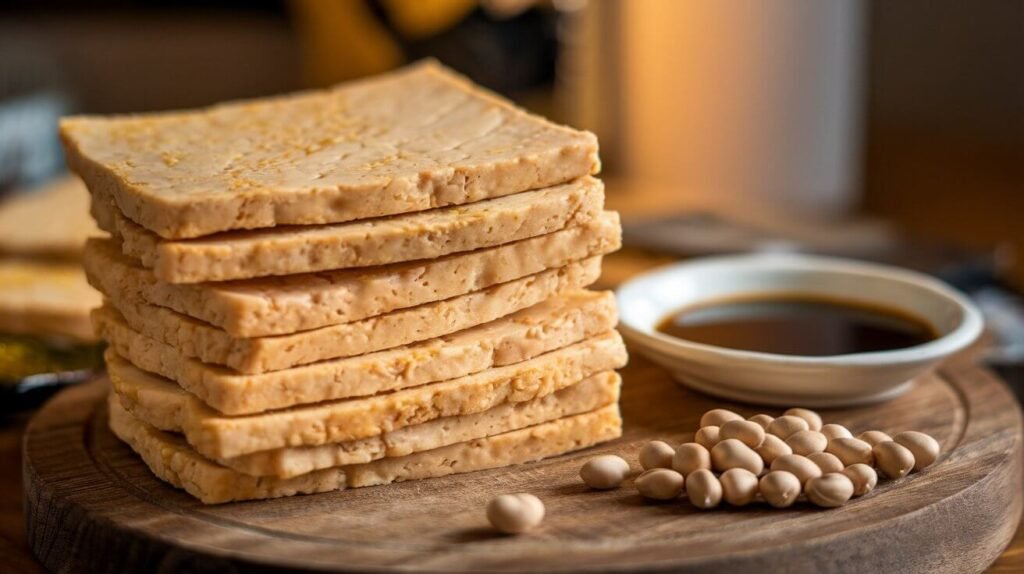
Recipe: Homemade Tempeh
Ingredients:
- 2 cups soybeans
- 2 tablespoons vinegar
- 1 teaspoon tempeh starter culture
Instructions:
- Soak the soybeans overnight, then boil them for 30 minutes.
- Drain the beans and mix with vinegar.
- Once cooled, add the tempeh starter and mix well.
- Spread the mixture evenly in a perforated bag and incubate at 86°F (30°C) for 24-48 hours until it forms a firm cake.
Health Benefits
- High in plant-based protein, supporting muscle growth and repair.
- Contains prebiotics that nourish gut bacteria.
- May help reduce cholesterol levels and improve heart health.
7. Natto
Natto is a traditional Japanese fermented soybean dish known for its strong smell, sticky texture, and unique umami flavor. It is made by fermenting soybeans with Bacillus subtilis, a beneficial bacterium that enhances the nutritional content. Natto is often eaten with rice and is packed with nutrients like vitamin K2, which is essential for bone and heart health.

Recipe: Traditional Natto
Ingredients:
- 2 cups soybeans
- 1 packet natto starter (Bacillus subtilis spores)
- 2 tablespoons water
Instructions:
- Soak the soybeans overnight, then boil or steam them until soft (about 6 hours).
- Drain the beans and place them in a sterilized container.
- Dissolve the natto starter in water and evenly distribute it over the soybeans.
- Cover the container with plastic wrap and puncture small holes to allow airflow.
- Incubate at 100°F (37°C) for 24 hours, then refrigerate for 1-2 days before consuming.
Health Benefits
- High in vitamin K2, which supports bone and cardiovascular health.
- Contains nattokinase, an enzyme that may help reduce blood clotting and improve circulation.
- Packed with probiotics that support gut health and digestion.
8. Kombucha
Kombucha is a fermented tea made by adding a symbiotic culture of bacteria and yeast (SCOBY) to sweetened tea. The fermentation process produces probiotics, organic acids, and antioxidants that may benefit digestion and immune function.

Recipe: Homemade Kombucha
Ingredients:
- 4 cups water
- 4 black or green tea bags
- 1/2 cup sugar
- 1 cup starter kombucha (from a previous batch or store-bought)
- 1 SCOBY
Instructions:
- Boil water and steep the tea bags for 10 minutes, then dissolve the sugar into the tea.
- Let the tea cool to room temperature, then pour it into a glass jar.
- Add the starter kombucha and gently place the SCOBY on top.
- Cover with a breathable cloth and secure it with a rubber band.
- Ferment at room temperature for 7-14 days, tasting occasionally.
- Once it reaches the desired tartness, bottle and refrigerate.
Health Benefits
- Contains probiotics that promote gut health and digestion.
- Rich in antioxidants, which help reduce inflammation and oxidative stress.
- May support liver function and detoxification.
9. Pickles (Fermented)
Unlike vinegar-based pickles, lacto-fermented pickles are made by soaking cucumbers in a salt brine, which encourages the growth of beneficial bacteria. These pickles are crunchy, tangy, and packed with probiotics.
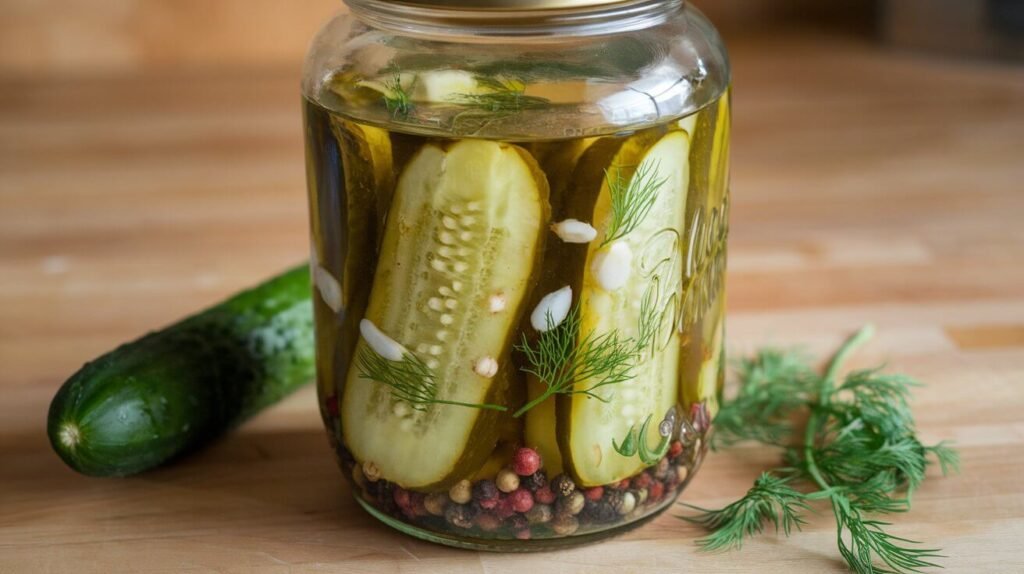
Recipe: Homemade Fermented Pickles
Ingredients:
- 4 small cucumbers
- 2 tablespoons sea salt
- 2 cups water
- 2 cloves garlic, crushed
- 1 teaspoon dill seeds or fresh dill
- 1/2 teaspoon black peppercorns
Instructions:
- Dissolve the sea salt in water to create a brine.
- Pack the cucumbers, garlic, dill, and peppercorns into a sterilized jar.
- Pour the brine over the cucumbers, ensuring they are fully submerged.
- Cover loosely and let it ferment at room temperature for 5-10 days.
- Once fermented, refrigerate and enjoy.
Health Benefits
- Supports digestion with natural probiotics.
- Contains vitamins A and K, which are important for vision and bone health.
- May help regulate blood sugar levels due to their fiber content.
10. Traditional Buttermilk
Traditional buttermilk is a fermented dairy product made by culturing milk with lactic acid bacteria. It has a tangy taste and is often used in baking, dressings, and beverages. Unlike commercially produced buttermilk, which is simply cultured, traditional buttermilk is probiotic-rich.
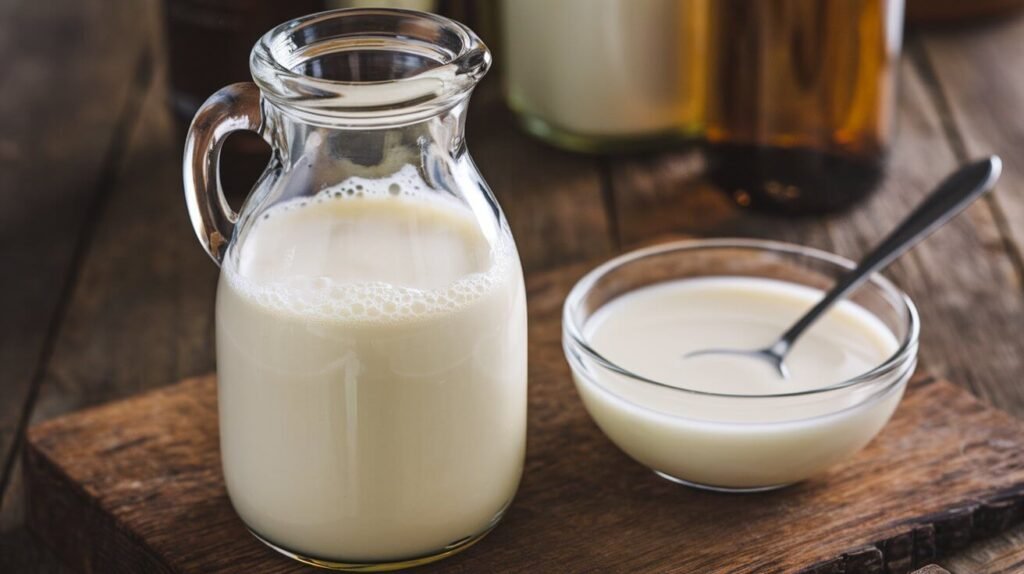
Recipe: Homemade Buttermilk
Ingredients:
- 1 cup whole milk
- 1 tablespoon plain yogurt or cultured buttermilk
Instructions:
- Pour the milk into a clean jar.
- Stir in the yogurt or buttermilk and mix well.
- Cover loosely and let it sit at room temperature for 12-24 hours.
- Once thickened, refrigerate and use as needed.
Health Benefits
- Contains probiotics that improve gut health and digestion.
- Rich in calcium, supporting strong bones and teeth.
- May help boost immunity by promoting beneficial gut bacteria.
11. Sourdough Bread
Sourdough bread is made by fermenting dough with wild yeast and lactic acid bacteria. Unlike commercial bread, it doesn’t require added yeast, as the natural fermentation process helps break down gluten and phytic acid, making it easier to digest.
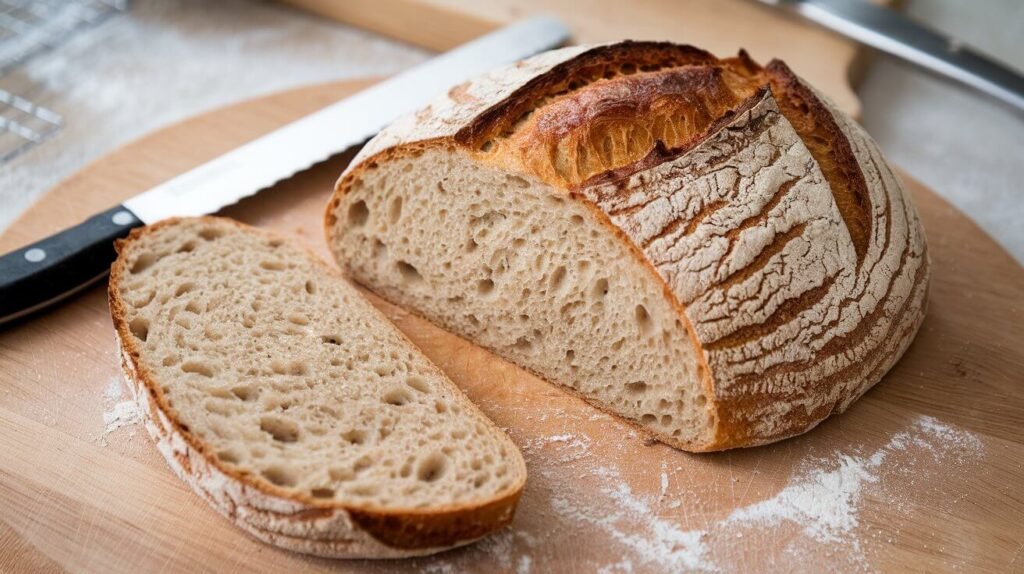
Recipe: Homemade Sourdough Bread
Ingredients:
- 4 cups all-purpose or whole wheat flour
- 1 cup active sourdough starter
- 1 ½ cups water
- 2 teaspoons salt
Instructions:
- Mix flour, water, and starter in a large bowl. Let rest for 30 minutes.
- Add salt and knead the dough until smooth.
- Cover and let it ferment for 12-24 hours at room temperature.
- Shape the dough and let it proof for another 3-4 hours.
- Bake in a preheated oven at 450°F (230°C) for 30-40 minutes.
Health Benefits
- Easier to digest than regular bread due to fermentation.
- Contains beneficial prebiotics that support gut health.
- Lower glycemic index, which may help regulate blood sugar.
12. Lassi
Lassi is a traditional Indian probiotic drink made from yogurt. It is a refreshing, fermented beverage that aids digestion and is often flavored with fruits or spices.
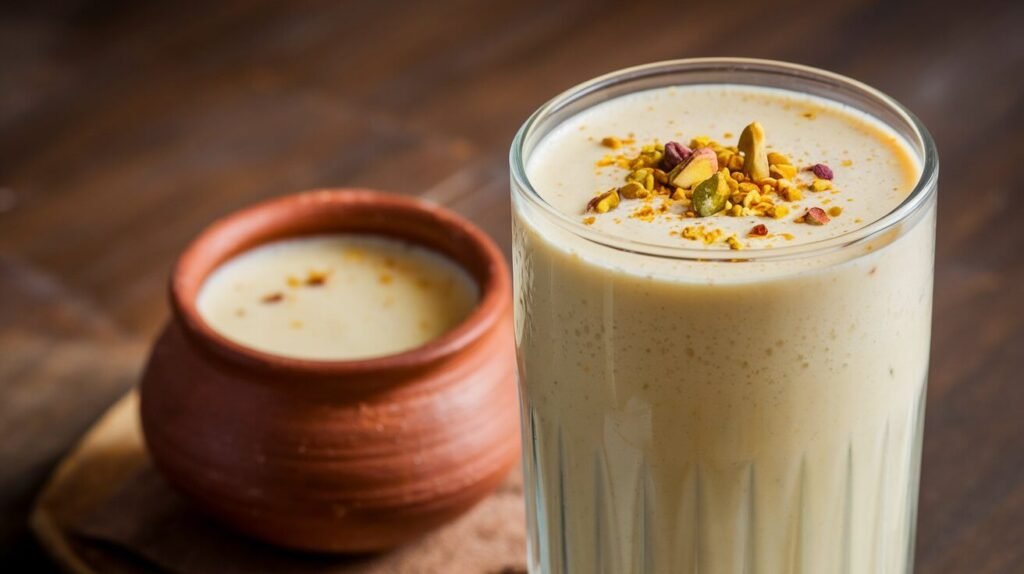
Recipe: Classic Sweet Lassi
Ingredients:
- 1 cup plain yogurt
- ½ cup water
- 2 tablespoons sugar or honey
- ¼ teaspoon cardamom powder
Instructions:
- Blend all ingredients until smooth.
- Serve chilled with a garnish of crushed nuts or saffron.
Health Benefits
- Rich in probiotics that improve digestion.
- Supports hydration and cooling of the body.
- Contains calcium and protein for bone and muscle health.
13. Kvass
Kvass is a traditional Eastern European fermented beverage made from rye bread. It has a slightly sour and tangy taste and is rich in beneficial bacteria.

Recipe: Homemade Kvass
Ingredients:
- 2 slices of dark rye bread
- 4 cups water
- 1 tablespoon sugar
- ¼ teaspoon yeast
Instructions:
- Toast the bread until dark and crispy.
- Add it to a jar with water, sugar, and yeast.
- Let it ferment at room temperature for 24-48 hours.
- Strain and refrigerate before drinking.
Health Benefits
- Supports gut health with probiotics.
- Rich in B vitamins for energy and metabolism.
- May help detoxify the liver.
14. Apple Cider Vinegar
Apple cider vinegar (ACV) is made by fermenting apples with yeast and bacteria. It contains acetic acid, which has been linked to various health benefits.
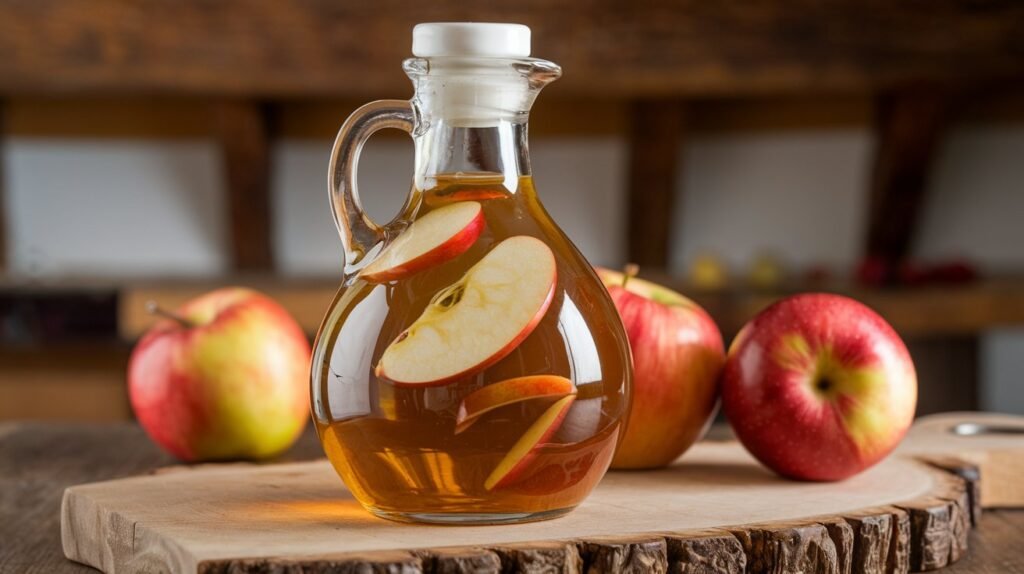
Recipe: Homemade Apple Cider Vinegar
Ingredients:
- 3 apples, chopped
- 2 tablespoons sugar
- 4 cups water
Instructions:
- Place apples in a jar and dissolve sugar in water.
- Pour the mixture over apples, covering them completely.
- Cover with a breathable cloth and let ferment for 3-4 weeks.
- Strain and store in a cool place.
Health Benefits
- Supports digestion by increasing stomach acid.
- Helps regulate blood sugar levels.
- Contains antimicrobial properties.
15. Fermented Black Garlic
Black garlic is made by fermenting fresh garlic under controlled conditions. It has a sweet, tangy flavor and is packed with antioxidants.
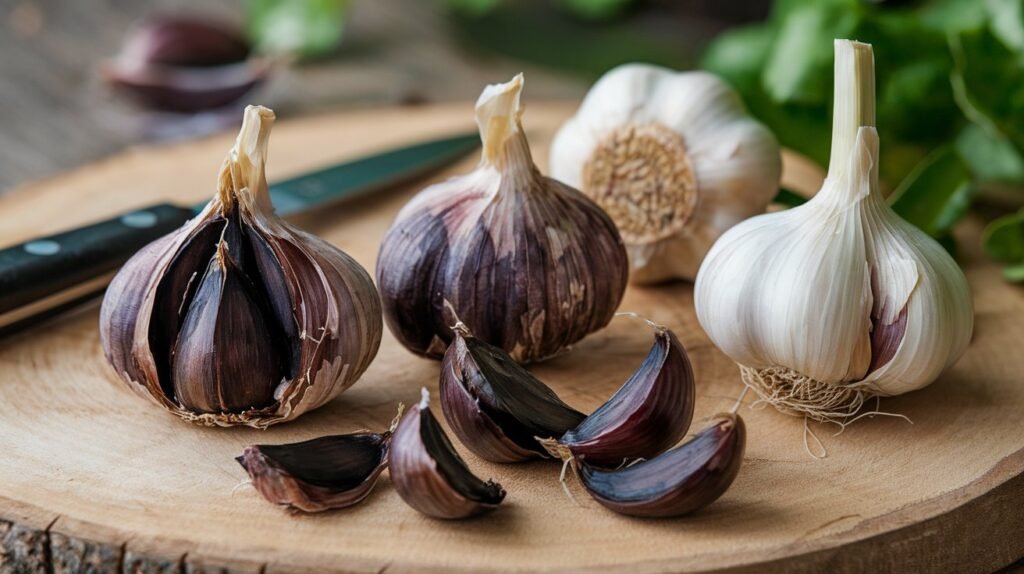
Recipe: Homemade Fermented Black Garlic
Ingredients:
- Whole garlic bulbs
Instructions:
- Place garlic bulbs in a fermenting chamber at 140°F (60°C) with 80-90% humidity for 3-4 weeks.
- Once blackened and soft, store in a cool place.
Health Benefits
- Rich in antioxidants that support heart health.
- May boost the immune system.
- Contains anti-inflammatory properties.
16. Fermented Tofu
Fermented tofu is a Chinese delicacy known for its strong aroma and creamy texture. It is made by aging tofu with beneficial bacteria.

Recipe: Homemade Fermented Tofu
Ingredients:
- 1 block firm tofu
- 2 tablespoons salt
- ½ cup rice wine
Instructions:
- Cut tofu into cubes and sprinkle with salt.
- Let it sit for 24 hours, then submerge in rice wine.
- Store in an airtight jar and ferment for 5-7 days.
Health Benefits
- Rich in probiotics and plant-based protein.
- Supports gut health and digestion.
- Contains essential amino acids.
17. Idli
Idli is a South Indian fermented rice cake made from fermented rice and lentils. The natural fermentation enhances its nutrient profile.
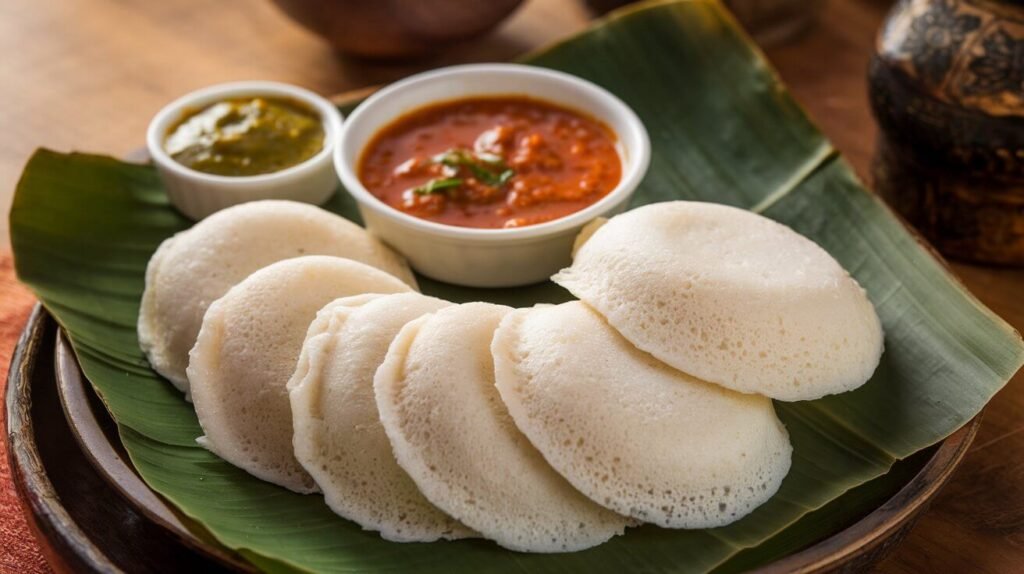
Recipe: Traditional Idli
Ingredients:
- 2 cups rice
- 1 cup urad dal (black gram)
- 1 teaspoon salt
Instructions:
- Soak rice and dal separately for 6 hours.
- Grind them together into a smooth batter and add salt.
- Let it ferment overnight until it doubles in size.
- Steam in an idli mold for 10-15 minutes.
Health Benefits
- Easy to digest and rich in probiotics.
- Provides essential amino acids from lentils.
- Low in fat and gluten-free.
18. Rejuvelac
Rejuvelac is a fermented drink made from sprouted grains. It is known for its slightly tangy flavor and high probiotic content.
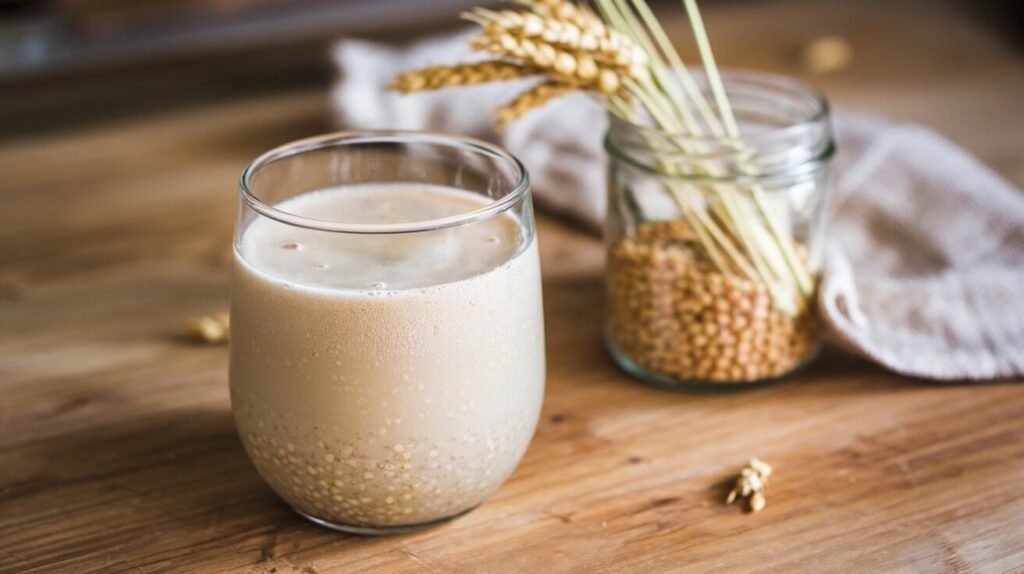
Recipe: Homemade Rejuvelac
Ingredients:
- 1 cup wheat berries
- 4 cups water
Instructions:
- Soak wheat berries overnight, then drain and sprout for 2 days.
- Blend with water and let it ferment for 24-48 hours.
- Strain and refrigerate.
Health Benefits
- Improves digestion and gut health.
- Rich in enzymes that aid nutrient absorption.
- Supports immune function.
19. Fermented Coconut Yogurt
Coconut yogurt is a dairy-free probiotic-rich alternative to traditional yogurt, made by fermenting coconut milk with live cultures.

Recipe: Homemade Coconut Yogurt
Ingredients:
- 2 cups coconut milk
- 1 probiotic capsule
Instructions:
- Heat coconut milk until warm (not boiling).
- Stir in the probiotic powder from the capsule.
- Cover and let ferment at room temperature for 12-24 hours.
- Refrigerate before consuming.
Health Benefits
- Supports gut microbiome with dairy-free probiotics.
- Rich in healthy fats and antioxidants.
- Boosts immune function.
20. Fermented Cabbage Juice
Fermented cabbage juice is a probiotic-rich drink made by fermenting cabbage with water and salt. It is often used as a natural remedy for digestive issues.
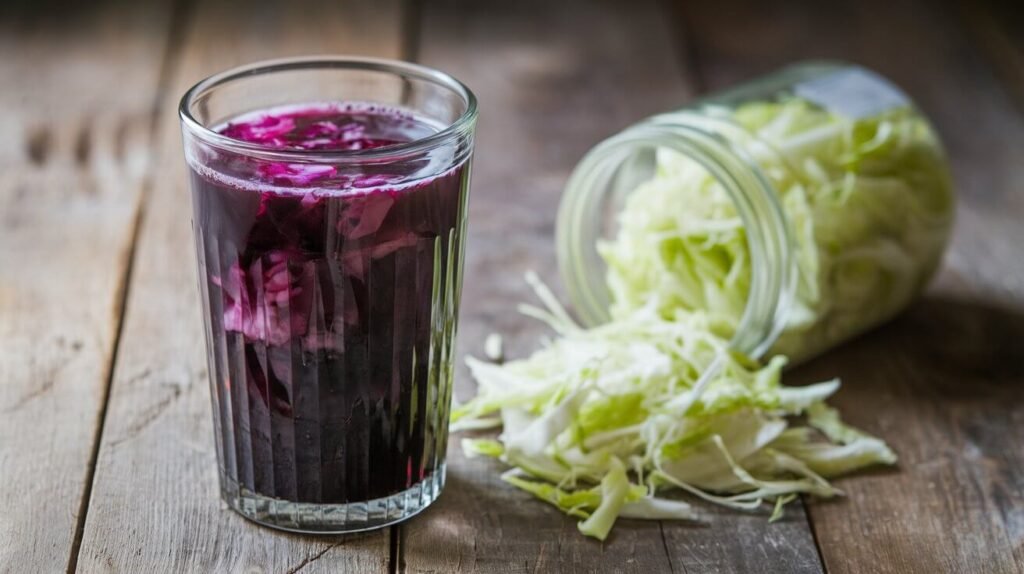
Recipe: Homemade Fermented Cabbage Juice
Ingredients:
- 1 small cabbage, shredded
- 2 cups water
- 1 teaspoon sea salt
Instructions:
- Blend cabbage, water, and salt until smooth.
- Let it ferment in a sealed jar at room temperature for 3-5 days.
- Strain and refrigerate before drinking.
Health Benefits
- Supports digestion and gut health.
- Rich in vitamins C and K.
- Helps detoxify the body.
Embracing Fermented Foods for a Healthier You
Fermented foods are more than just flavorful additions to your diet; they are powerful allies in maintaining overall well-being. From boosting gut health and enhancing digestion to strengthening immunity and supporting heart health, these probiotic-rich foods offer a range of scientifically proven benefits. The process of fermentation not only increases the bioavailability of essential nutrients but also introduces beneficial bacteria that create a balanced gut microbiome—essential for overall health.
By incorporating a variety of fermented foods into your meals, you can enjoy their unique tastes while improving your body’s ability to absorb nutrients and fight off illnesses. Whether you prefer yogurt, tempeh, kimchi, or sourdough, there are countless ways to enjoy these gut-friendly superfoods. So, start fermenting, experimenting, and making these nutritional powerhouses a staple in your diet for long-term health benefits!

